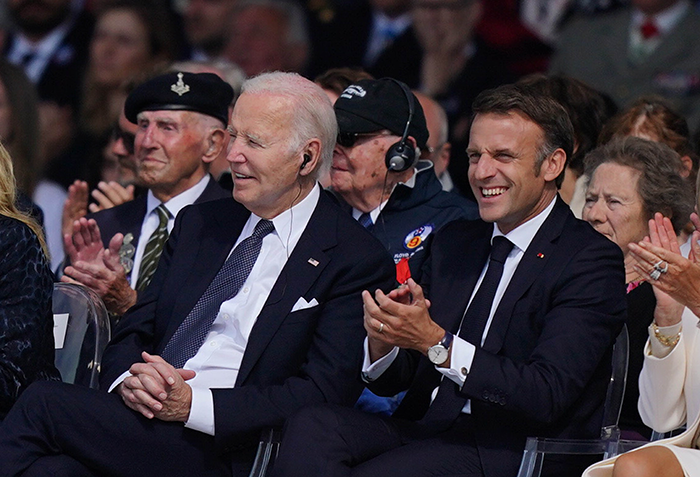Interviews / Political and Geostrategic Observatory of the United States
10 June 2024
Joe Biden’s Visit to France: What Future for Transatlantic Cooperation?

For his first State visit of 2024, Joe Biden travelled to France—also a first since the beginning of his presidency. The five-day trip was marked by the 80th anniversary of the Normandy landings and a tribute to American veterans, but also by a major political agenda focused on Europe, multilateralism and the war in Ukraine. Lavishly received by Emmanuel Macron at the Élysée Palace on Saturday 9 June, the two men used the visit to highlight the closeness between Paris and Washington. What can we learn from the US president’s visit to France? How should we assess Franco-American relations and, more broadly, transatlantic cooperation? Insights from Marie-Cécile Naves, Director of Research at IRIS and a specialist in the United States.
Joe Biden and several European heads of state travelled to France to commemorate the 80th anniversary of the 6 June 1944 landings. Against the backdrop of the return of war to the European continent through the Russian-Ukrainian conflict, the presence of President Volodymyr Zelensky, and the forthcoming G7 and NATO summits, how significant is this event in terms of Washington’s commitment to its European allies?
It is important for these heads of state to tell and sustain a shared story—one of lessons learned from the past and the strength of common values. This is conveyed through images, symbols, and words that carry performative weight. The parallel between the fight against Nazi Germany and the defence of freedom in Ukraine fits into this narrative. Joe Biden, for instance, said: “To turn away from Ukraine would be to forget what happened here.” He is also addressing countries around the world that do not understand the West’s support for Ukraine against Russia, and who view this policy as a double standard when compared with the West’s stance on Gaza. Another point of commonality between France and the United States is that the far right is (more than ever in France) on the threshold of power.
Alongside the commemorations, Joe Biden held talks with Emmanuel Macron as part of a State visit. What is the current state of relations between Paris and Washington? How does this relationship manifest itself in major international issues such as the Israeli-Palestinian conflict?
A five-day State visit for an American president is significant, particularly in the middle of an election campaign. It is a deep mark of respect. This visit was the reciprocal of Emmanuel Macron’s State visit to Washington in December 2022. But beyond the friendship between the two countries and the rapport between the two men, there are numerous geopolitical issues that are sources of significant tension: protectionism, the defence of green industries and electric vehicles, competition with China, and of course the outcome of the war in Ukraine and the conflict between Israel and Hamas—on which disagreements are far from absent, notably over the recognition of a Palestinian state and the timeline for such recognition.
Where does the battle for the next US presidency between Joe Biden and Donald Trump currently stand? To what extent could Donald Trump’s return to power undermine transatlantic relations?
Joe Biden advocates for international partnerships and multilateralism (which does not prevent him, like all his predecessors, from prioritising American interests—as evidenced by the persistence of protectionism), and for dialogue. He has no intention of abandoning Europe in the face of Vladimir Putin’s expansionist ambitions. “He will not stop at Ukraine,” the US president declared. Donald Trump, it is worth recalling, has pledged to end the war within 24 hours, which is effectively a way of saying he will end support for Europe if he returns to power. On that front, the outlook is crystal clear.

